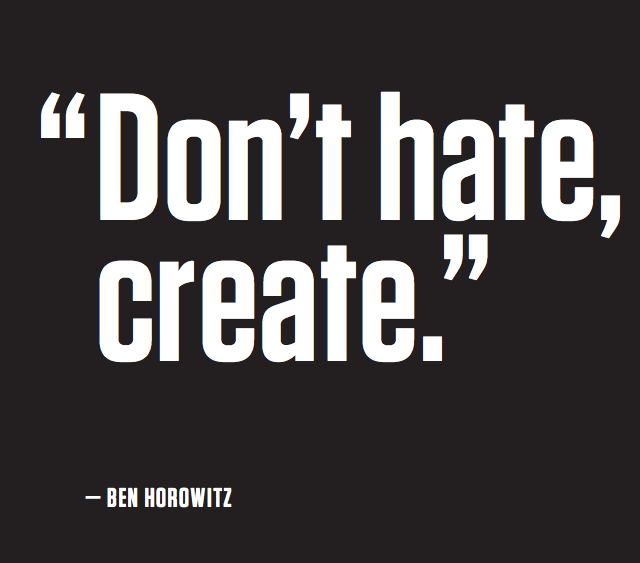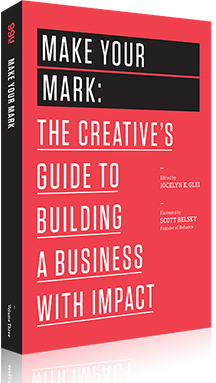
While ‘managing by bestseller’ is a misguided approach to fixing organizational problems, there is a lot to be learned from the leading experts and entrepreneurs on what's different about building a business today.
Make Your Mark: The Creative’s Guide to Building a Business with Impact, edited by Jocelyn Glei, features insights from twenty-one leading experts and entrepreneurs to explore the principles that propel some of today’s most successful companies.
It’s about “applying the forces of business to creativity.”
In the foreword to the book, Scott Belsky, the Founder of Behance and author of Making Ideas Happen, points to one of the fundamental problems with creativity: it’s often undiscoverable. And if it’s undiscoverable it has no impact.
Creativity has many definitions.
For me, creativity is solving problems in new ways and conceiving new ways of looking at the world.
Creativity can be expressed in many forms, like art, science, and thought.
But creativity is all too often undiscoverable and incomprehensible.
Art, without distribution and discovery, moves nobody. Did it ever exist? Science, without clear explanation and advocacy, won’t be understood by the masses. Will it make an impact?
Creation, he argues, “must be made accessible for consumption.” Creativity alone, is not enough. We need to make it consumable by channeling and packaging it.

The best businesses are purpose driven. But you can’t go far without an incredible product experience. What guides all great product development are the twin ideals of “an unstoppable enthusiasm for bringing something great into the world and a relentless focus on usability.” Making good products takes time.

Enter Sebastian Thrun, the leader behind the team that created Google Glass and the Google Self-Driving Car. He’s also the co-founder of Udacity, which is trying to disrupt education by improving the learning experience. Thrun does a Q&A in the book and it’s one of the best things I’ve read recently.
How do you focus your energies at the beginning of a project?
When thinking about products, I like to use a mountain-climbing analogy. The first step is to pick a peak. Don't pick a peak because it's easy. Pick a peak because you really want to go there; that way you'll enjoy the process.
The second thing is to pick a team you trust and that's willing to learn with you. Because the way mountain climbing really works is that you can't climb the entire route perfectly. You have to know that you are going to make mistakes, that you'll have to turn around, and that you'll have to recover.
You also have to maintain your sense of purpose. For a long time, it may feel like you're on the wrong path, but you must have the resilience to forge ahead. You just have to keep moving uphill.
It’s about the process not the outcome.
For me, the journey is much more delightful if you can derive pleasure from the process every day, rather than at the end of the year. If your goal is to IPO and get rich, then you're going to be in for a very long, very sad ride. Because most people don't IPO and don't get rich.
Our most important asset is our time, so I think it's best to manage your time well right now and be happy about it, rather than focus on some deferred goal, like buying a fancy car in the future. The data shows that people who are rich aren't any happier, so you might as well derive your happiness from what you are doing today.
How does iteration figure into your process? Do you think it's best to create a functional prototype as soon as possible?
To return to the mountain idea, if you think about it, there's no other way to get up the mountain than taking a hundred thousand steps. You could have all the meetings and all the documentation and work for weeks on end to make the perfect plan. But in my opinion, all you've done at that point is lost time. You've done nothing. You've learned nothing.
Sure, if this mountain has been climbed ten thousand times before, then you just get the book, and the maps, and you follow the same steps. But that's not innovation. Innovation is about climbing a mountain that no one has climbed before. So there ought to be some unknowns along the way because no one has solved the problem yet.
And when you're innovating, sheer thinking just won't work. What gets you there is fast iteration, and fast failing. And when you fail, you've done something great: you've learned something. In hindsight, it might look a little embarrassing, and people will say, "You should've known that." But the truth is you couldn't have known because it's unchartered territory. Almost every entrepreneur I know has failed massively many, many times along the way.
What's the most common mistake that people make when they're developing a product?
One mistake I see a lot is the eternal thinker, the perfectionist. This is the person that builds all the components without putting them together, because there's perfection in component development. And they have this idea that if you only put things together right before launch, everything will go fine. Of course, that never happens.
The second mistake I see is more of a character issue, which is being discouraged by failure. Where you do something three or four times, spend half a year in development, and think, "Oh my god, I'm not there yet, let me change my career . . ." So that's a lack of perseverance.
The last one I see is being driven by fear. When your competitor does something new, you become fearful and decide that you're going to change course. But every single time you do this, you're already behind your competitor and that's just a bad idea. You have to have faith in yourself, and believe in your vision.
At some time, everybody is driven by fear. But we need to—as much as we can—take fear out of the game. One way to do this is to imagine that you are already successful. You've looked into the future, and you've succeeded. What would you enjoy doing today given that knowledge?

Clearly, certain personality types are more comfortable with iteration and failure than others. Do you think you can learn to be if it doesn't come naturally?
It's obvious to me that there's a certain personality type that can deal with failure more than others. But I think this awareness can also be acquired, especially when you realize that the failures that come out of experimentation really don't relate to you as a person. It's just the course of innovation; failure is a systemic part of that process.
For instance, if you're driving a car, and after three hundred miles the car runs out of gas, no one takes offense because the "failure" is inherent to the car, not to you. It's not your failure to operate the car correctly. We all know that you have to refill the gas tank; that's just the way it is. So if we think of failure in innovation in the same way—as having to refill the gas tank regularly—we can take it much less personally.
That's a great metaphor. So you think the idea of constant—and playful—experimentation is the best mind-set for innovation?
It's very uncommon for people to have the attitude of "Wow, I don't know." In childhood, researchers call this a "growth mind-set"—this idea that you're comfortable with the fact that you just don't know something yet, or that you just can't do something yet. But most people are raised with this feeling that they know everything.
But if you know everything, you can't possibly innovate, right? It's impossible, because there is nothing new to learn or discover.
There's this funny saying that I like: "After high school, kids know everything, after their bachelor's degree, they know something, and after a PhD, they now know that they know nothing."
I think that the ability to see how much more there is to know and be humble about it is actually a good thing. Returning to the mountain metaphor, every mountain climber I know of feels small in the mountains and enjoys the feeling of being small. No matter what you do, the mountain is always bigger than you are.
Make Your Mark is the third book in 99u’s “missing curriculum” for creative leaders. The two prior ones are Manage Your Day-to-Day: Build Your Routine, Find Your Focus, and Sharpen Your Creative Mind and Maximize Your Potential: Grow Your Expertise, Take Bold Risks & Build an Incredible Career.
—
Brought to you by: ValueWalk: Evergreen and fresh content on the top value investors and investment gurus - learn how to become a better investor right now - for free..





No comments:
Post a Comment